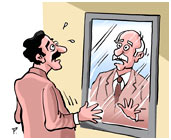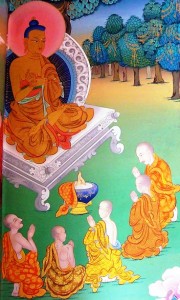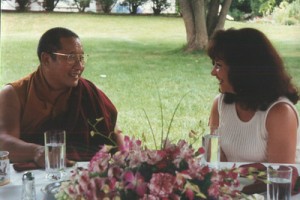The following is an excerpt from a teaching by Jetsunma Ahkon Lhamo called “Bringing Virtue Into Life”
Denial, in my opinion, is much worse than how fast our lives go. If we have even a meager life span of sixty years, if we really got it, if we really understood cause and effect, we would probably be motivated to start practicing early; and by the time that we were sixty and ready to die, we’d have something accomplished. We would have prepared for our next rebirth. But we don’t do that because we cannot connect the dots. We wait.
I think about the young people that I know, and even the young people that are very close to me. They have the idea that they have all the time in the world. I know because I used to have that idea. All the time in the world. It’s like Friday night. You’ve got the whole weekend so party hearty. It’s really like that. We really have this idea. So when we’re young we do not begin our practice. And then when we’re not so young, when we move into real adulthood, we still are in denial. I tell you when we’re finished being young, the next stage is to pretend that we’re young. That’s the next thing that we do. And then after pretending that we’re young doesn’t work, we imagine that we’re young. It’s sort of like that. We keep pushing off the inevitable, which is that moment when we get that life is really passing and something must be done.
This kind of narcotic quality that is part and parcel of samsaric existence is the real enemy here. It is the real enemy. It causes us to think very strangely, in an odd way, a way that is not productive and is not protective and beneficial toward ourselves. We are not being our own best friends in other words. So what happens is we are deluded, we are stuck. We stay without any understanding. We simply cannot commit to practice. We have this Scarlet O’Hara kind of idea, that tomorrow is soon enough. Tomorrow everything will be fine. So we find ourselves in something of a bind.
A person who has not been able to practice these thoughts that turn the mind toward Dharma is in the most trouble because they can’t move to the next step. That’s the next thought that turns the mind towards Dharma, and it’s a very simple one. It’s actually very logical. It’s about as logical as the law of gravity seems to be, and the law of gravity seems to be pretty logical. Drop it and it goes down…every time that I’ve seen. Show me something different, but every time I’ve seen it. The law of gravity is kind of logical. , I don’t know the physics of it, but, basically it means that this is heavier than the air that it displaces so it’s going down. And the earth will pull it down because of the magnetic quality that the motion of the earth produces. So we understand that this is very logical.
But there is another logical truth that we are missing completely. It’s just as logical, equally as logical, but again we’re playing the game of forever young, never gonna die and always deluded. That’s the game we’re playing. And here’s the truth that is logical, the truth that we’re missing that is so simple. If you think about it, you know it’s true and it’s this: Non-virtuous behavior, such as killing, stealing, adultery, judgment, lack of kindness, lack of generosity, harming others, lying, these kinds of activities bring about unhappiness, every time. There is no case in which you can engage in nonvirtuous behavior in order to produce happy results. It will never happen. It will never happen. In the same way that apple seeds will not grow orange trees, it simply doesn’t happen.
Nonvirtuous behavior, negative behavior, will always, every time, bring unhappiness. The funny thing is we always engage in nonvirtuous activity in order to bring us happiness. That’s what we think we’re doing. We lie about somebody else so that, let’s see… Here’s a good example: Let’s say that I have a boyfriend and my boyfriend loves two women. I’m one of them. So I might, in order to bring about my own happiness, lie about that other woman and say “Oh, she’s no good. You don’t want her. She’s no good.” I might lie about that other woman so I can have this boyfriend. I’m thinking that this lie is going to bring me happiness. It’s never going to happen. It’s never going to happen, because eventually what’s going to happen is this: Someday you’re going to want something very much. Someday you’re going to be completely and totally entitled to something, and that person will be able to keep it from you. You see? It may not happen in this lifetime. It may not happen in the next lifetime. It could happen 10,000 lifetimes from now, where you couldn’t possibly remember, but it will make you unhappy. Eventually it will make you unhappy.
Copyright © Jetsunma Ahkon Norbu Lhamo. All rights reserved









